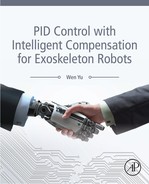Introduction
Proportional-integral-derivative (PID) control is widely used in industrial robot manipulators. The integrator in the PID controller reduces the bandwidth of the closed-loop system, leads to worse transient performance, and even destroys the stability. Many robot manipulators use proportional-derivative (PD) control with gravity and friction compensations, and the gravity and friction models are needed. Intelligent control has dramatically changed the face of industrial control engineering. The intelligent compensation for PD/PID control has developed rapidly recently. Because of the interdisciplinary nature of the subject, there are only a few books consisting of the general know-how in designing, implementing, and operating PD/PID control with intelligent compensations.
This book introduces how to combine the traditional PD/PID control techniques with the intelligent control, and presents several recent methods to design neural, fuzzy, and sliding mode compensators, even with a high-gain velocity observer.
We also extend the neural PD control into neural PID control to reduce the integration gain. We give explicit conditions on how to select the linear PID gains by the proofs of semiglobal asymptotic stability and local asymptotic stability with a velocity observer. These conditions are applied in both task space and joint space. The desired trajectory is generated with a modified hidden Markov model. Several experimental studies on exoskeleton robots with these intelligent PID controllers are addressed.
The book is suitable for advanced undergraduate students and graduate engineering students. In addition, practicing engineers will find it appropriate for self-study.
